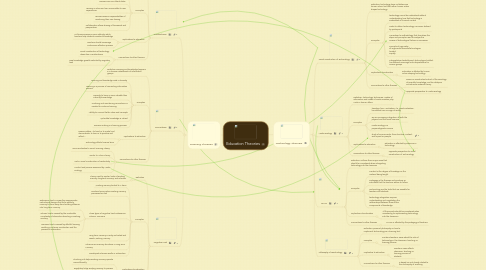
1. Learning Thoeries
1.1. Constructivism
1.1.1. Definition: human learning is built upon the foundation of previous learning
1.1.2. Principles
1.1.2.1. Learning is NOT a passive transmision of information
1.1.2.2. Learners are NOT blank slates
1.1.2.3. Leaning is active and can accomodate to new experiences
1.1.2.4. Learners assume responsibilities of monitoring their own leaning
1.1.2.5. Collaboration allows sharing of framework and perspectives
1.1.3. Implications to education
1.1.3.1. Let learners assume more authority, wihle teachers help students construct knowledge
1.1.3.2. Teachers should encourage continuous reflection process
1.1.4. Connections to other theories
1.1.4.1. Social construction of technology draws from Constructivism
1.1.4.2. New knowledge growth restricted by cognitive load
1.2. Connectivism
1.2.1. Definition:Learning and knowledge happens in a diverse networkwork of information groups
1.2.2. Principles
1.2.2.1. Learning and knowledge rests in diversity
1.2.2.2. Learning is a process of connecting information sources.
1.2.2.3. Capacity to learn is more valuable than currently knownledge
1.2.2.4. Nurturing and maintaining connections is needed to continue learning.
1.2.2.5. Ablility to connect fields, ideas and concepts
1.2.2.6. up-todate knowledge is valued
1.2.2.7. Decision-making is a learning process
1.2.3. Implications to education
1.2.3.1. Downes states: "to teach is to model and demonstrate, to learn is to practice and reflect."
1.2.3.2. Technology affects how we learn
1.2.4. Connections to other theories
1.2.4.1. Some simliarities to Social Learning Theory
1.2.4.2. Similar to Active Theory
1.2.4.3. Usd in Social Construction of Technolohy
1.2.4.4. Product and process examined by Media Ecology
1.3. Cognitive Load
1.3.1. Definition
1.3.1.1. Theory used to explain limits of working memory, longterm memory, and schemas
1.3.2. Principles
1.3.2.1. Working memory limited to 7 items
1.3.2.2. Overload occurs when working memory processes too fast
1.3.2.3. Three types of cognitive load: Extraneous, Intrinsic, Germane
1.3.2.3.1. Extraneous load is caused by inappropriate instructional designs that force working memory to focus away from building schemas into long term memory.
1.3.2.3.2. Intrinsic load is caused by the irreducible complexity of elements interacting in working memory.
1.3.2.3.3. Germane load is caused by effortful learning resulting in Schema construction and the process of automation.
1.3.2.4. Long term memory is nealry unlimited and assists Working Memory
1.3.2.5. Schemas are memory structures in Long Term Memory
1.3.2.6. Developed schemas results in automation
1.3.3. Implications to Education
1.3.3.1. Chunking info helps working memory operate more efficiently
1.3.3.2. Repetition helps working memory to process and develop automation
1.3.3.3. Provide meaningful informational contexts or landscapes
1.3.4. Connections to other theories
1.3.4.1. Theory for building new/previous knowledge
2. Technology Theories
2.1. Social Construction of Techonology
2.1.1. Definition: technology does not determine human action, but that rather, human action shapes technology
2.1.2. Principles
2.1.2.1. technology cannot be understood without understanding how that technology is embedded in its social context
2.1.2.2. Seeks to define techonology's success, defined by participants
2.1.2.3. Considered a methodology that formalizes the steps and principles used to analyze the causes of technological failures or successes
2.1.2.4. Principle of Symmetry: all arguments/theories/tehcnologies treated equally
2.1.2.5. Interpretative Flexibility:each technological artifact has different meanings and interpretations for various groups
2.1.3. Implications to education
2.1.3.1. Education is affected by human action shaping technology
2.1.4. Connections to other theories
2.1.4.1. Draws on constructivst school of the sociology of scientific knowledge, and its subtopics include actor-network theory
2.1.4.2. Opposite perspective to Media Ecology
2.2. Media Ecology
2.2.1. Definition: technology, techniques, modes of information and codes of communication play a role in human affairs
2.2.2. Principles
2.2.2.1. transition from “civilization” to “post-civilization” has shifted man's image of reality
2.2.2.2. we are increasing integration of both the physical and the social sciences
2.2.2.3. media ecology is a preparadigmatic science
2.2.2.4. study of environments: their structure, content, and impact on people
2.2.3. Implications to education
2.2.3.1. Education is affected by advances in technology
2.2.4. Connections to other theories
2.2.4.1. Opposite prespective to Social Construction of Techonology
2.3. TPACK
2.3.1. Definition: outlines three major areas that should be considered when intergrating technology into the classroom
2.3.2. Principles
2.3.2.1. Content is the degree of knowlege on the material being taught
2.3.2.2. Pedagogy is the theories and practices on education that the teachers wishes to follow
2.3.2.3. Techonology are the tools that are avaiable for teachers and students
2.3.2.4. technology integration requires understanding and negotiating the relationships between these three components of knowledge
2.3.3. Implications to education
2.3.3.1. All three parts should be considered when considering to implementing technology into the classroom
2.3.4. Connections to other theories
2.3.4.1. TPACK is affected by the pedagogy of teachers
2.4. Philosophy of Teachnology
2.4.1. Definition: personal philosophy on how to implement techonology as a learning tool
2.4.2. Principles
2.4.2.1. Contains teacher's views about the role of techonolgy in the classroom, teaching, & learning process
2.4.3. Implicatios to education
2.4.3.1. Teacher's views affects classroom, teaching, & learning process of students
2.4.4. Connections to other theories
2.4.4.1. Is based on and closely related to the Philosophy of Teaching
